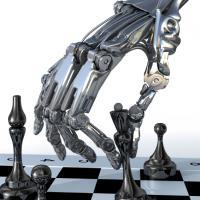
Metal-Heads or Humans? Who's More Intelligent at Chess?
Let’s be honest. Computer chess programs are unbeatable. They can beat me, they can beat you, they beat Kasparov.
Did it mean Deep Blue was more intelligent than Kasparov?
Are computers and artificial “intelligence” really capable of something comparable to human intelligence. Can they ultimately become not just intelligent but more intelligent than us, humans. Can these machines and metal-heads become a threat to our intelligence? Are we creating the superior beings? Are we going to become pets, the dogs of the house?
Scary, uh?
.jpg)
Artificial intelligence pioneer John McCarthy in 1966, when he and his students programmed a computer to play chess with a computer in Russia
The Deep Blue-Kasparov chess war opened a new age: the age of metal-heads, in which men began developing the minds of machines.
But does Fritz or any other "expert" really know or need to know anything about chess? Can they come up with any sort of sustained or deep strategy? The answer to all these questions is — NO!!!
“Inteligent” machines and computer programs are actually pretty stupid.
All they can do for us is mostly tasks like information retrieval, question answering, checking my spelling as I’m typing right now, speech recognition, diagnostics in medicine. They are the undisputed chess champions of the world, but they can’t understand a simple English conversation. Nor computer chess programs even attempt to imitate the strategic thinking of human players (isn’t that ironic for a game that considers itself as the supreme game of strategy?)
So what’s the secret of these dumb “experts”?
Their strength lay entirely in almost limitless computer memory and rapid computation. In other words, brute force processing power. This approach let them produce dazzling performance using minimal application-dependent knowledge.
More on this war underway here
